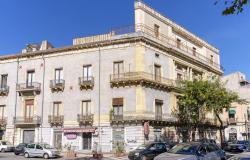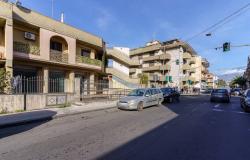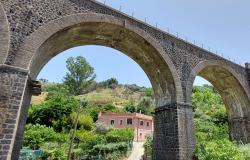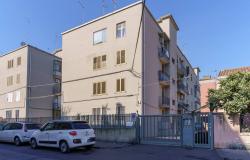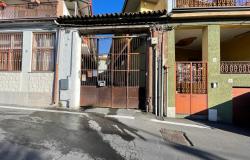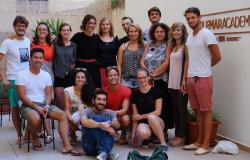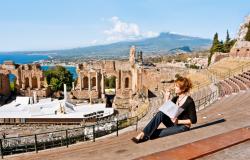Words by Pat Eggleton
On an October day in a normally peaceful cemetery in the hills south of Palermo, a crowd of journalists gathers and an old women screams,
“Go away! Leave my brother alone.”
Rosalia Pisciotta and other locals are watching, with the international media, the exhumation of the remains of Salvatore Giuliano, folk hero or traitor to his class, depending on how you view Sicilian history. Rosalia’s brother, Guiliano’s lieutenant, Gaspare, is also buried in the cemetery and she is afraid that the authorities will want to exhume his body, too. But for the time being, Gaspare Pisciotta is left to sleep in peace.
Salvatore Giuliano, known locally as Turiddu, was born in Montelepre on 16th November 1922. By the time he was 13, he had left school and was working on the land with his father. During World War II he became involved in the local black market and began carrying arms to protect himself. In 1943 he joined the MIS, the Sicilian Independence Movement.
In the same year, Salvatore Giuliano carried out his first killing, shooting a police officer who challenged him for carrying black market grain. Giuliano claimed that the police officer had fired first. Giuliano’s father and other local men were rounded up and arrested and later Giuliano helped some of them escape from prison in Monreale. Some of these men stayed with him and became his loyal followers in his outlaw life.
Giuliano became a colonel in the armed branch of the MIS, EVIS and was promised a pardon for his crimes if the movement gained power in Sicily. It is said that he wanted Sicily to become a US state.
 “Colonel” Turriddu trained his own men and carried out raids and attacks against police and government targets. In 1946 he led over 1,000 separatists in an attack on the authorities. Soon he became a legendary figure, a Robin Hood to the poor and a person to be feared to the landowners of the time. Of all the legends about Salvatore Giuliano, the one I like best is that when he robbed the Duchesa di Pratameno, he allowed the lady to keep her wedding ring and borrowed a book from her which he later politely returned.
“Colonel” Turriddu trained his own men and carried out raids and attacks against police and government targets. In 1946 he led over 1,000 separatists in an attack on the authorities. Soon he became a legendary figure, a Robin Hood to the poor and a person to be feared to the landowners of the time. Of all the legends about Salvatore Giuliano, the one I like best is that when he robbed the Duchesa di Pratameno, he allowed the lady to keep her wedding ring and borrowed a book from her which he later politely returned.
 But Salvatore Giuliano’s name entered the journals of infamy on 1st May 1947 when he led his men to the Portella della Ginestra mountain pass in the hope of capturing the communist Girolamo Li Causi. It was a public holiday and families had gathered in the countryside to celebrate. The occasion turned into a massacre in which eleven innocent people were killed, including a woman and three children. Over thirty people were wounded. Giuliano later claimed that he had ordered his men to fire above the heads of the crowd and recently new investigations have revealed that the victims were shot from below with weapons that Giuliano and his followers could not have possessed. It is possible that Giuliano was being used by the Mafia and conservatives to put down popular risings against landowners and the source of a mysterious letter which Giuliano received before setting out for the Portella della Ginestra has never been ascertained.
But Salvatore Giuliano’s name entered the journals of infamy on 1st May 1947 when he led his men to the Portella della Ginestra mountain pass in the hope of capturing the communist Girolamo Li Causi. It was a public holiday and families had gathered in the countryside to celebrate. The occasion turned into a massacre in which eleven innocent people were killed, including a woman and three children. Over thirty people were wounded. Giuliano later claimed that he had ordered his men to fire above the heads of the crowd and recently new investigations have revealed that the victims were shot from below with weapons that Giuliano and his followers could not have possessed. It is possible that Giuliano was being used by the Mafia and conservatives to put down popular risings against landowners and the source of a mysterious letter which Giuliano received before setting out for the Portella della Ginestra has never been ascertained.
By 1948 Giuliano’s support was waning but he continued to dare the police to capture him and to carry out raids and attacks. He was shot dead by Carabiniere Captain Antonio Perenze for resisting arrest at Castelvetrano on 5th July 1950….. or was he? Some say that he escaped, first to Tunisia and then to the United States and that a look-alike was buried in his place.
Gaspare Pisciotta claimed that he himself was offered a pardon to shoot Giuliano and he is generally believed to have betrayed his commander’s whereabouts to the police. Pisciotta died of poisoning in prison in 1954.
On October 15th this year a court in Palermo decided to exhume the body in the tomb marked “Salvatore Giuliano” in Montelepre. Ribs, teeth and a thigh bone have been removed for examination but it will be many weeks before a result is known.
 Meanwhile, it has emerged that Turiddu confessed his sins to a priest a few days before his presumed death: in a letter to the then Bishop of Monreale, a Milanese priest called Agostino Reni wrote that he had heard the “poor boy’s” confession and absolved him. Padre Reni said that Giuliano had wanted to receive the Eucharist and that he had advised him to go to a little church in the deserted early morning. Giuliano told the Padre that he did not think that he would see him again but that perhaps they would meet “up there”. Let us leave the story of Turiddu with the words of Padre Reni:
Meanwhile, it has emerged that Turiddu confessed his sins to a priest a few days before his presumed death: in a letter to the then Bishop of Monreale, a Milanese priest called Agostino Reni wrote that he had heard the “poor boy’s” confession and absolved him. Padre Reni said that Giuliano had wanted to receive the Eucharist and that he had advised him to go to a little church in the deserted early morning. Giuliano told the Padre that he did not think that he would see him again but that perhaps they would meet “up there”. Let us leave the story of Turiddu with the words of Padre Reni:
“The judgement of God is not always the same as the judgment of man.”

